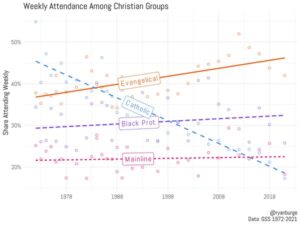The “old evangelization” is better than the “new evangelization” not because old things are better (which is generally true) or that human-nature is more fallen than it was in the 16th century (which is also probably true) but because of two other specific reasons:
1) The “old evangelization” goes back to Apostolic times where the ascetical life of union with Christ drove the exterior life of spreading the Catholic Faith (unlike the “new evangelization” that is reliant on people being relevant and “contagious.”)
2) The old-evangelization worked, unlike the new evangelization. Even promoters of the new evangelization admit that in the United States, for every convert coming in the front-door to the Catholic faith, we lose four or five Catholics through the back door.

Crisis Magazine recently showed attendance at the TLM is growing, unlike…

…mainstream Catholicism where weekly attendance among Catholics has been on a sharp decline since Vatican II, despite even the most lukewarm of bishops and pastors begging their people to be “missionary disciples.” How can you be a missionary disciple if you know less teaching than a traditional child who owns a Baltimore Catechism? The above graph also proves that the problem within the Catholic Church is internal to the Church, not external to the Church. How do we know this? Because evangelical Protestant communities continue to grow despite our general cultural-rot in the United States.
As I’ve written before, we were mendaciously taught in seminary to say our numbers in the Catholic Church tanked after Vatican II not because of Vatican II but because of the sexual revolution. But if this were true, then half of the solid US Catholics in the 1980s wouldn’t have gone to conservative MegaChurches where they at least heard at least a sprinkling of the full-Gospel. I mean, were the evangelical MegaChurches not affected by the sexual-revolution? Of course they were. Therefore, we tanked our own numbers in the Catholic Church by something very nefarious internally.
Over 2,000 years, the Catholic Church made well over one billion converts. But shortly after Vatican II, the Western Hemisphere lost well over 50 million Catholics to either secularism or Protestantism. Besides the obvious tanking of our own doctrine and liturgy at the Council, what are the other major lacunæ (holes) in the New Evangelization? Perhaps a better title to this blog might be Why conservatives are losing the culture war against the liberals because—in full transparency here—I really don’t care about the “New Evangelization” anymore. It’s not in my interest to see it succeed when I see the TLM-world evangelizing so much better. (If you doubt this last sentence, look at the above two graphs.)
But in any case, here’s four of many lacunæ in the “New Evangelization” or in the conservative Catholic world as a whole:
- Leftists are more committed to their religion without compromise. Recently, an exorcist explained that every sin from the fall of Adam and Eve to the infiltration of the Catholic Church in the 19th century to the 21st century problems in American politics come down to a demon making a human being erroneously believe he can’t be separated from a particular good at the cost of that human’s relationship with God. In other words, the item from which you refrain to detach yourself (usually under pretexts like “I need porn/drugs/gambling/gossip because I have had a hard life” or “I have to do this compromise to keep the ministry going”) is the foothold in which Satan wins you to hell. Most conservatives espouse the moral theology error of consequentialism or proportionalism to justify being “pastoral” instead of pleasing God regardless of the consequences. Hence, many conservatives are not as fervent for God as leftists are for Satan.
- Conservatives often fear Satan more than they fear God. Of course, fear of God needs to be filial while our fear of Satan needs to be zero. Also, I’m not saying most conservatives spend a lot of time thinking about fear of Satan. But I am saying that conservatives buckle under the slightest pressure to use, say, aborted-based-vaccines or fake-pronouns of co-workers or curse-words with family members to be “relevant in the New Evangelization.” Why do they do this? I don’t know, but I suspect it is because they fear what Satan can do to them more than God. Most justify this by claiming they’re “picking the right hill to die on—like loving Jesus!— not political issues.” Such a phrase sounds fervent, but those who utter it usually forget one can sin against Jesus politically while claiming to love Him emotionally. Rather, the saints condescended in mercy but never compromised on conviction even for the sake of being “pastoral:” If God be for us, who can be against us?—Rom 8:31b.
- Conservatives can’t side with God until the get off contraception (and also immodest dress.) Granted, most couples living “the New Evangelization” are not on contraception. If you are on the Pill, stop it because I medically show in this podcast that you are killing your own children if you are on it. But modesty is a stickier topic because people say shallow things like “God looks at my heart, not the length of my dress.” Well, we’re not Cartesian dualists. We as Catholics believe and know that God looks at your heart as revealed in the external decisions of your life. See what old-school prelates said about modesty here.
- We need to work for souls in heaven more than human-progress on earth. One aspect of this is that (without espousing a Calvinist total-depravity outlook) is that we must have only a cautious-optimism of changing a culture as rotten as this one and inspire and love and evangelize the person in front of us. In Michael Knowles’ book, Speechless, he points out that “leftists rage at the fallen-world” trying to make a utopia on earth. Michael Oakeshott wrote: “To be conservative . . . is to prefer the familiar to the unknown, to prefer the tried to the untried, fact to mystery, the actual to the possible, the limited to the unbounded, the near to the distant, the sufficient to the superabundant, the convenient to the perfect, present-laughter to utopian-bliss.” Yes, when we have our eyes set on heaven, we don’t rage against a fallen world. Rather, with humility and humor, we can prefer present-laughter to utopian-bliss.
